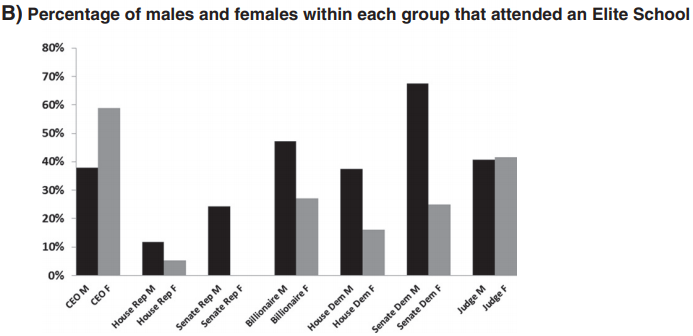Psychologist Jonathan Wai looked at this factor in his 2012 article; Investigating America's elite: Cognitive ability, education, and sex differences, published in the Intelligence journal. His metric for intelligence is based on admission to a highly selective college, working from conclusions drawn by Charles Murray in Coming Apart: The State of White America, 1960-2010:
The average graduate of an elite college is at the 99th centile of IQ
of the entire population of seventeen-year-olds. This is consistent
with the median combined Critical Reading and Mathematics scores of
1400 or more among the top dozen schools in the most recent U.S. News
& World Report rankings.
In 2010, a combined score of 1400 put a student at
about the 97th percentile of all students who took the SAT (based on
the distribution produced by the known means and standard deviations
for the two tests and a correlation of +0.7 between them). But the
number of test-takers in 2010 represented only 36 percent of the
seventeen-year-olds in the country. Any plausible assumptions about
the proportion of the 62 percent of seventeenyear-olds who didn’t take
the SAT who could have gotten a combined score of 1400 or more puts a
student who actually does score 1400 well into the 99th centile of the
seventeen-year-old population.
Working from these assumptions, Wai identified 29 universities and liberal arts colleges, 12 law schools, and 12 business schools that met Murray's definition of an elite institution. He then used the Biographical Directory of the United States Congress to investigate the educational records of the Senators & Representatives of the 112th Congress.

He found that not only were Democrats in both the House and Senate significantly more likely to have attended an Elite School than Republicans, they were also more likely to have attended Harvard. He concludes:
Democrats have a higher ability and education level than Republicans
Research has indicated that individuals who are politically liberal
are more likely to have higher ability than those who are politically
conservative in America (Kanazawa, 2010) and Britain (Deary, Batty, &
Gale, 2008). However, this finding pertained to voters rather than
political leaders those people had elected. This study demonstrates
that in America, Democrats were more likely than Republicans to have a
higher percentage of Senate and House members who attended an Elite
School which places these individuals in the top 1% in ability. Therefore, among the elected elite,
Democrats had a higher ability and education level, on average, than
Republicans.
I feel that it's very important to point out the limitations that Wai notes, for example, the approximation of individual ability level based on average test scores at very specific institutions, and the use of these approximated test scores as a proxy for intelligence. However, Wai's article seems like a pretty good objective academic analysis despite these limitations.
